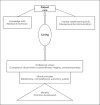Principles of Clinical Ethics and Their Application to Practice
- PMID: 32498071
- PMCID: PMC7923912
- DOI: 10.1159/000509119
Principles of Clinical Ethics and Their Application to Practice
Abstract
An overview of ethics and clinical ethics is presented in this review. The 4 main ethical principles, that is beneficence, nonmaleficence, autonomy, and justice, are defined and explained. Informed consent, truth-telling, and confidentiality spring from the principle of autonomy, and each of them is discussed. In patient care situations, not infrequently, there are conflicts between ethical principles (especially between beneficence and autonomy). A four-pronged systematic approach to ethical problem-solving and several illustrative cases of conflicts are presented. Comments following the cases highlight the ethical principles involved and clarify the resolution of these conflicts. A model for patient care, with caring as its central element, that integrates ethical aspects (intertwined with professionalism) with clinical and technical expertise desired of a physician is illustrated.
Keywords: Autonomy; Confidentiality; Ethics; Informed consent; Integrated patient care model; Professionalism.
© 2020 The Author(s) Published by S. Karger AG, Basel.
Conflict of interest statement
The author declares that he has no conflicts of interest.
References
-
- Carrese JA, Sugarman J. The inescapable relevance of bioethics for the practicing clinician. Chest. 2006 Dec;130((6)):1864–72. - PubMed
-
- Self DJ, Olivarez M, Baldwin DC., Jr Clarifying the relationship of medical education and moral development. Acad Med. 1998 May;73((5)):517–20. - PubMed
-
- Beauchamp TL, Childress JF. Principles of bioethics. 7th ed. Oxford University Press; 2013.
Publication types
MeSH terms
LinkOut - more resources
Full Text Sources


